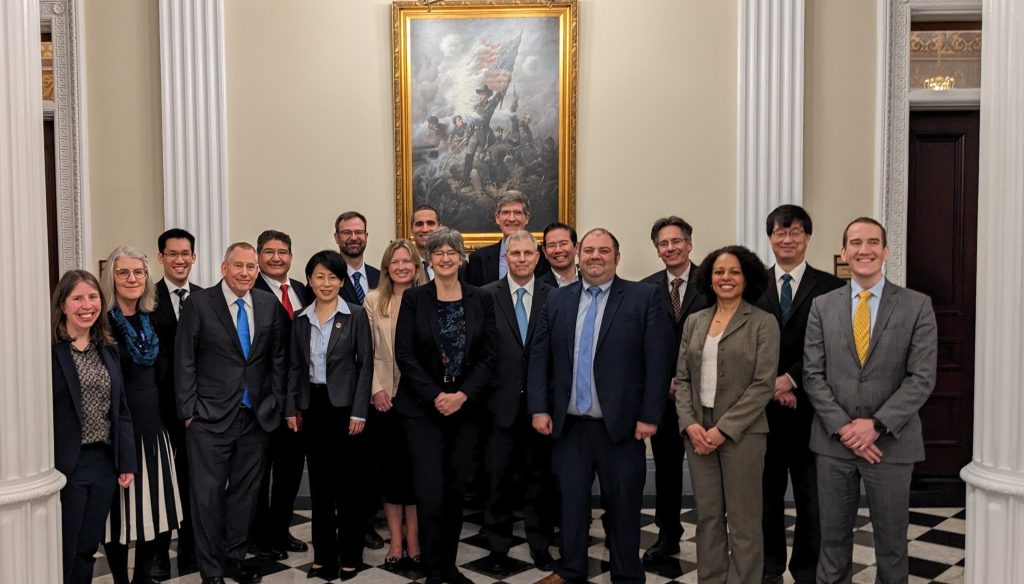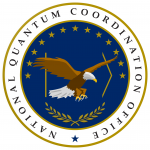Highlighting the National Q-12 Education Partnership
(February 29, 2024) Origin stories make the best superhero movies. I am no superhero, but I still remember what my undergraduate thesis advisor said when I told him that I wanted to design quantum computers in graduate school: “You’ll never find that!” My journey in quantum information science began a year earlier when I found a book in the physics library on “quantum computing.” I hardly believed it. Somehow, I had found this thing that combined my two loves and majors: physics and computer science.
This past year has been about renewal. The National Quantum Initiative (NQI) began in 2018 as an eleven-year program, with many of the initial activities only authorized for five years. It is now time to reauthorize the NQI Act. The National Quantum Coordination Office (NQCO) did a few things to inform this process beyond our existing national strategy and annual reports. We organized the agencies that are represented in the National Science and Technology Council (NSTC) Subcommittee on Quantum Information Science (SCQIS) and Subcommittee on Economic and Security Implications of Quantum Science (ESIX) to give their input on the reauthorization. The National Quantum Initiative Advisory Committee (NQIAC), too, spent substantial time evaluating the progress of the NQI and making recommendations on renewing the NQI. It is worth a read. During my testimony to the House Committee on Science, Space, and Technology, I summarized these recommendations, and I think they are worth repeating here:
- Reauthorize the National Science Foundation (NSF) and Department of Energy (DOE) quantum information science research and education centers and remove the limit on the number of centers authorized for these agencies. Provide support to enable fundamental science research, applied research, demonstration, and commercialization.
- Support NSF programs to expand and broaden participation in quantum information science, including potential new mid-career development programs and bridge programs focused on preparing post-baccalaureate students for graduate programs in quantum information science and engineering.
- Strengthen the whole-of-government approach to implementing the original National Quantum Initiative Act by expanding the authorized core agencies and providing new dedicated international funding to follow-up on U.S. commitments to international cooperation. OSTP recommended expanding the initial authorized core agencies which were initially NSF, DOE, and the National Institute of Standards and Technology (NIST) to include the State Department in the National Quantum Initiative Act. The National Institutes of Health (NIH), the National Aeronautics and Space Administration (NASA), and the Department of Homeland Security (DHS) also have important roles to play, for example, in both terrestrial and space-based quantum sensing. The NQCO welcomes and encourages further integration of the Department of Defense (DOD) and the Intelligence Community (IC) research funding organizations and laboratories, which have played an important role in the development of quantum information science in this country since the beginning.
- Translate discoveries in quantum information science to commercial utility and agency missions through lab-to-market engineering, systems integration programs, and public-private partnerships. In particular, the NSF Directorate for Technology, Innovation, and Partnerships (TIP) offers a new pathway to focus technology development and engineering for promising applications. Other opportunities include those previously authorized in the CHIPS and Science Act, such as the DOE Quantum Network Infrastructure Research Program and the Quantum User Expansion for Science and Technology program (QUEST). The NIST Center for Quantum Engineering Research could conduct engineering research to accelerate scientific breakthroughs and accelerate quantum technology transfer.
- Prioritize funding to upgrade the aging infrastructure of laboratory facilities and create and equip new laboratories with the tooling necessary to engage in cutting edge quantum information science research. High-quality research capital is essential for the United States to remain competitive with world-wide investments and to recruit and retain the best talent.
Let me elaborate on the notion of a quantum international fund. This past year also marked the birth of a multilateral quantum dialogue; it began with a series of discussions two years ago that we nicknamed the 2^N group. Like any new collection of people with a purpose, the beginning must start with our shared values. Here is what my counterparts and I came up with for Guiding principles for a global quantum ecosystem informed by science, also available here and here:
- Promote scientific collaboration and the exchange of ideas to support quicker scientific discovery in QIST.
- Incorporate subject-matter expertise in policy discussions and decisions.
- Share best practices and coordinate outreach in joint efforts to grow the QIST talent base.
- Promote research security, align and reinforce technology protection measures, and support a fair marketplace to create a vibrant and trusted global QIST industry.
- Plan for the deployment of quantum-resistant cyber infrastructure, such as quantum-resistant cryptography, to responsibly address the risks of QIST.
- Increase quantum awareness and readiness in the development and use of quantum-based technologies and applications.
- Encourage the discovery of use cases of QIST for the benefit of society.
These principles build on the decades of shared values in the Science and Technology Agreements underpinning our international research cooperation. What you see here is obvious in retrospect, as we all face the same challenges: from growing the pool of talent to enable this new field, to finding the applications that will propel us forward, to properly balancing technological development and security.
It is fitting to use this letter to highlight the National Q-12 Education Partnership, which began 4 years ago. One of the first things I wanted to do when I became NQCO director was to launch a series of videos interviewing scientists on their different careers paths, including those in government – the Quantum Profiles. I am pleased that my home lab, the Laboratory for Physical Sciences (LPS), has just funded the investigators leading the Q-12 to expand and broaden the Quantum Profiles toward that original vision, including interviews with those like me who chose to go into government.
Quantum is more than quantum physics. It starts with having good careers for people to aspire to and builds on a foundation of education, inspiration, and, most importantly, experiences. You too can make a contribution. All types of skillsets will be needed to build future quantum computers and entanglement distribution networks. I often joke that my superpower has been all the television I watched as a kid. But really it started when my mom taught me the scientific method during my first science fair; the summer internships and research experiences that followed gave me the confidence to keep going.
My hope is that many other kids get the chances I did. The Biden-Harris Administration’s leadership and the Q-12 has been integral to making the United States a leader in World Quantum Day and developing curricula like the QuanTime and APS Quantum To-Go programs. In the next five years of the NQI, we need to continue developing the nation’s quantum workforce. The LPS Qubit Collaboratory will be the highlight of my next and last Director’s letter.

Charles Tahan is the Assistant Director for Quantum Information Science at OSTP, and Director of the National Quantum Coordination Office.
More on The National Quantum Coordination Office (NQCO): The NQCO is responsible for coordinating the National Quantum Initiative and working across the federal agencies to develop the national strategy for quantum information science, including other quantum technologies like sensors and networks. The US quantum strategy is focused on getting the science right, enhancing American competitiveness, and enabling our people to benefit from this new field. Quantum information science is the quintessential critical and emerging technology. It is foundational, meaning that it will impact many different technologies from new types of sensors to disruptive quantum computers. It is emerging, because despite decades of funding – federal investment alone has doubled over the last few years – we are still learning how applications of this technology may affect society and are still working to solve the many scientific hurdles that we still face.


